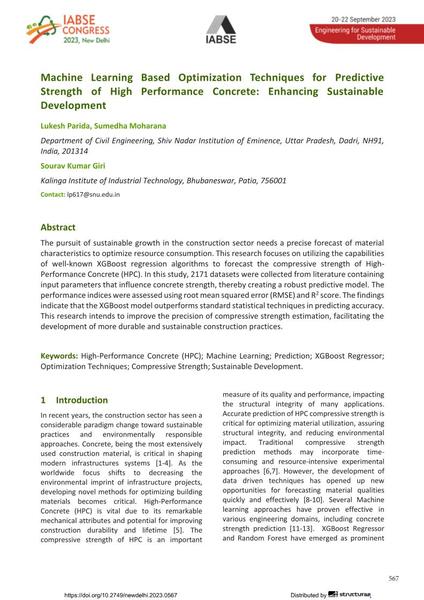Machine Learning Based Optimization Techniques for Predictive Strength of High Performance Concrete: Enhancing Sustainable Development

|
|
|||||||||||
Détails bibliographiques
| Auteur(s): |
Lukesh Parida
(Department of Civil Engineering, Shiv Nadar Institution of Eminence, Uttar Pradesh, Dadri, NH91, India, 201314)
Sumedha Moharana (Department of Civil Engineering, Shiv Nadar Institution of Eminence, Uttar Pradesh, Dadri, NH91, India, 201314) Sourav Kumar Giri (Kalinga Institute of Industrial Technology, Bhubaneswar, Patia, 756001) |
||||
|---|---|---|---|---|---|
| Médium: | papier de conférence | ||||
| Langue(s): | anglais | ||||
| Conférence: | IABSE Congress: Engineering for Sustainable Development, New Delhi, India, 20-22 September 2023 | ||||
| Publié dans: | IABSE Congress New Delhi 2023 | ||||
|
|||||
| Page(s): | 567-572 | ||||
| Nombre total de pages (du PDF): | 6 | ||||
| DOI: | 10.2749/newdelhi.2023.0567 | ||||
| Abstrait: |
The pursuit of sustainable growth in the construction sector needs a precise forecast of material characteristics to optimize resource consumption. This research focuses on utilizing the capabilities of well-known XGBoost regression algorithms to forecast the compressive strength of High- Performance Concrete (HPC). In this study, 2171 datasets were collected from literature containing input parameters that influence concrete strength, thereby creating a robust predictive model. The performance indices were assessed using root mean squared error (RMSE) and R2 score. The findings indicate that the XGBoost model outperforms standard statistical techniques in predicting accuracy. This research intends to improve the precision of compressive strength estimation, facilitating the development of more durable and sustainable construction practices. |
||||
